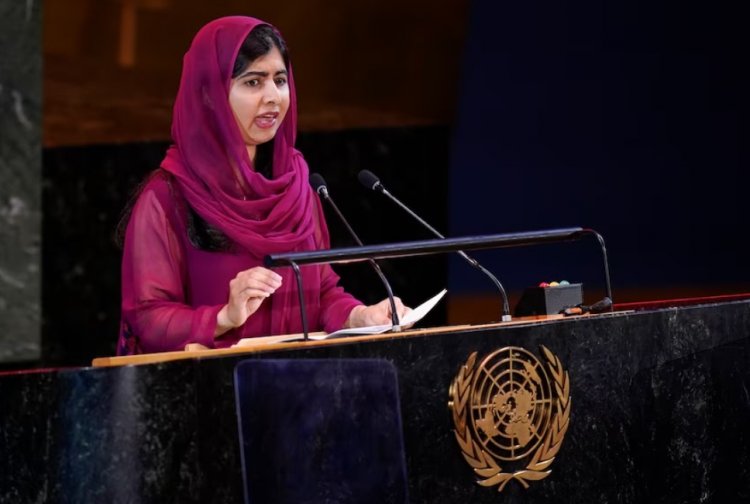Malala Day: Celebrating the Courageous Journey of Malala Yousafzai

14-07-2023
Roza Cseby
Women’s Rights Researcher,
Global Human Rights Defence.
July 12 marks a significant day in the global calendar as it is observed as Malala Day, named after the remarkable young woman, Malala Yousafzai who has become an emblem of courage and advocacy for girls' education worldwide. The day coincides with the birthday of Malala and it was on this day in 2013 as well when she delivered her first powerful speech at the United Nations Speech on Youth Education to tell her story to 500 young people and world leaders. This just occurred a year after surviving the attack by the Taliban for speaking out against their oppressive restrictions on female education in Pakistan (Blumberg, 2023) (The Guardian, 2013).
Childhood and early activism
Malala's journey began in Swat valley in Pakistan, where she grew up as the daughter of an outspoken social activist and educator. In 2007, the region fell under the grip of the Tehreek-e-Taliban Pakistan (TTP), who imposed strict Islamic law and systematically targeted girls' schools, denying them access to education. Despite the looming danger, in 2009, Malala started blogging for BBC under a pseudonym about the growing militancy in her hometown and her fear of her school being attacked. By December 2009, Malala's continued television appearances and coverage in local and international media made it clear that she was the BBC's young blogger. Once her identity became known, his activism was widely recognised. In December 2011, she received Pakistan's first National Youth Peace Award (Blumberg, 2023).
Shooting and Nobel Peace Prize
In October 2012, the Taliban made an attempt on Malala's life, shooting her in the head while she was returning home from school. She survived the attack and was flown to the United Kingdom for extensive medical treatment and rehabilitation. This tragic incident brought global attention to her cause and galvanized support for girls' education worldwide. Following her recovery, Malala refused to be silenced and became even more determined to fight for the rights of girls to receive quality education. In collaboration with her father, she established the Malala Fund with the objectives to expand access to education for girls and women, especially those hardest to reach and affected by conflict and disaster and improve the quality and relevance of education, ensuring that content, teaching practices and learning environment are gender-sensitive. In December 2014, Malala received the Nobel Peace Prize in recognition for her activism and she became the youngest-ever Nobel laureate (Malala Fund, n.d.) (UNESCO, 2021).
July 12 2023: 10th anniversary of her historic speech at the United Nations
On July 12, 2023, Malala marked the 10th anniversary of her historic speech at the United Nations. On this occasion, she gave a speech in Nigeria and reflected on the progress made over the past decade and the challenges that persist. She highlighted the devastating impact of the COVID-19 pandemic, which forced many children out of school, particularly in low-income countries. Furthermore, she emphasized the grave situation in Afghanistan, where girls are now banned from education, representing a complete reversal of the progress she fought so hard to achieve.“Even as a teenager I understood that progress can be slow, but I never expected to witness a complete reversal: an entire country of girls dropping out of school…” - she said in her speech (UN Web TV, 2023).
Malala reminded the audience that while one person alone cannot change the world, change can start with just one person. She called for collective action, urging governments, activists, educators, parents, and community leaders to unite in their efforts to ensure that every child has access to 12 years of quality education. She emphasised that this is the vision that the Malala Fund continues to strive for, tirelessly working towards a world where girls' education is not only a privilege but a fundamental right.
“I stood at the stage of the United Nations and with 16 years old optimism I declared that one child, one teacher, one book and one pen can change the world, but I will tell you today what I did not know then. One child even with the best resources and encouragement, one child can’t change the world, neither one president or prime minister, one teacher, one activist, one parent. No one can change the world on their own. What is true is that change can begin with just one person. And to begin and to build a world where every child has access to 12 years of quality education we must join forces. We must support girls and governments together with activists, educators, parents and community leaders.” - Malala (UN Web TV, 2023).
Sources and further readings:
UN Web TV (2023). Malala Day 2023: Addressing a decade of work for girls' education. Retrieved on 14 July, 2023 from: https://media.un.org/en/asset/k12/k12u8fv1eu
Malala Fund (2023). Malala Fund is working for a world where every girl can learn and lead. Retrieved on 14 July, 2023 from https://malala.org/
Blumberg, N. (2023). Malala Yousafzai. Encyclopedia Britannica. Retrieved on 14 July, 2023 from https://www.britannica.com/biography/Malala-Yousafzai
UNESCO (2021). UNESCO Malala Fund for Girls’ Right to Education. Retrieved on 14 July, 2023 from https://en.unesco.org/themes/education-and-gender-equality/malala-fund
The Nobel Peace Prize (2014). Malala Yousafzai - Nobel Lecture. Retrieved on 14 July, 2023 from https://www.nobelprize.org/prizes/peace/2014/yousafzai/lecture/
The Guardian (2013). Malala Yousafzai: ‘Our books and our pens are the most powerful weapons'. Retrieved on 14 July, 2023 from https://www.theguardian.com/commentisfree/2013/jul/12/malala-yousafzai-united-nations-education-speech-text




 GHRTV
GHRTV 




























